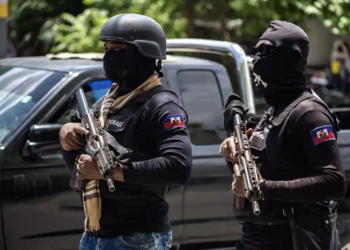Preparations for the Multi-national Security Support (MSS) mission in Haiti continue to sputter, giving the country’s gangs more time to fortify what could be a fierce response.
An initial deployment of 200 Kenyan police officers had been expected to land in Haiti on May 23, but their arrival was postponed at the last moment without explanation. It came days after a delegation of six Kenyan officials, including the commander of the security mission, landed in Port-au-Prince to find shortages of key equipment, including armored vehicles, weapons, and radios.
Kenya originally committed to lead the security mission to Haiti in October and pledged to send up to 1,000 officers to support the Haitian police to maintain security. A further 1,500 officers were promised by partner countries including Jamaica, Bangladesh, and Chad.
The officers were a response to gang violence, which has exploded in Haiti in recent months. In March, gangs attacked the country’s two largest prisons, freeing over 4,000 inmates, besieged the airport, and forced Ariel Henry, the country’s prime minister, into exile. Henry has since resigned.
In the latest escalation of violence, three American missionaries were attacked by gangs while leaving church on May 23. Davy Lloyd, one of the victims, was on the phone to his father as gang members tied him up and looted his house. Emergency response workers later found all three missionaries dead, and gang members appear to have burned Davy’s body.
Amidst growing instability, the foundations of the mission look increasingly shaky. A new legal challenge in Kenya filed on May 17 aims to scrap the mission altogether. The rules of engagement and strategy are still not in place. What’s more, donor countries have managed to raise just $21 million of the mission’s estimated $600 million cost.
“The role [of the mission’s deployment] is still fairly undefined … and 2,500 guys don’t stretch thick,” Dan Foote, former United States Special Envoy to Haiti, told InSight Crime. “It was probably limited by the purse … [but] going into a situation where gangs have all kinds of heavy weaponry with 2,500 guys is ridiculous.”
Speaking before the latest delays, Vanda Felbab-Brown, a senior fellow at the Brookings Institution and security expert, had similar sentiments.
“The security mission coming in is very weak, very inadequate, and the fact that it will be dribbling in these installments of 200 is problematic,” she said.
Despite the turbulence, Kenyan President William Ruto told the BBC that he now expected the first deployment of Kenyan police to take place in three weeks.
“I have confidence that our police … have the requisite knowledge on what to do and they have the professional capacity to handle this situation,” Ruto said during a US state visit.
InSight Crime Analysis
As the mission scrambles to secure funds and access to basic communications equipment, Haiti’s gangs continue to build power and will present any eventual mission with immediate challenges.
G9 and G-Pèp, Haiti’s once rivalrous gang alliances, have united in their opposition to the security mission, forming a group called Vivre Ensemble (Living Together). Gangs in the alliance launched a series of coordinated attacks against state institutions in recent weeks, displacing civilians, seizing police stations, and cementing their control over strategic parts of Port-au-Prince.
5 Segonn, one of Haiti’s most powerful gangs, recently flaunted new high-powered weapons in a video posted to social media, raising concerns that arms may be leaking from military stockpiles in Latin America into the hands of Haitian criminal groups.
5 Segonn’s leader, Johnson Andre, alias “Izo,” is on the United Nations sanctions list and is believed to have links to drug trafficking organizations.
In April, Colombian President Gustavo Petro announced that inspections in two military bases revealed that large quantities of arms, bullets, and even missiles had gone missing. He suggested they were probably being used by criminal groups in Colombia, as well as Haiti, though a link between the missing weapons and Haitian gangs is yet to be definitively drawn.
Officially, an arms embargo has been in force in Haiti since 2022.
SEE ALSO: Prime Minister’s Resignation Tips Haiti Into Uncharted Territory
Felbab-Brown told InSight Crime that increased gang cooperation, access to high-caliber weapons, and new-found wealth derived from increased participation in drug trafficking amounted to an extraordinary increase in the tactical potency of the gangs that was unrivaled by any improvements seen in Haiti’s National Police.
“We’ve had two decades of Western efforts to train the police,” added Felbab-Brown. “Why is there this illusion that a bunch of Kenyans will somehow be effective in training up the police?”
The Haitian National Police, the institution the mission aims to support, has severely atrophied in recent years, with more than 2,000 officers deserting in 2023 alone, according to the force’s main trade union.
Haiti would need roughly 38,000 officers to bring the country to median levels of policing, according to the United Nations (UN). Haiti’s police force consists of 9,000 officers, according to government numbers, but no sources consulted by InSight Crime believed the official figure to be close to correct.
“Three thousand [officers] at any one time is more of an accurate assessment,” suggested Felbab-Brown.
Sources consulted by InSight Crime also questioned the Kenyan-led mission’s preparedness to take on Haiti’s criminal threats.
“The Kenyan police are middle of the road,” said Foote. “They’re not terrible, but they’re certainly not great, and they’re certainly not in a position where they ought to be training [police in] a country that’s in such a precipitous security situation.”
Foote also lamented that the international community, not for the first time, was repeating a narrowly focused operation to improve security in Haiti, without consideration of the broader problems affecting the country.
“We can’t just go in and kill a bunch of bad guys and call it a day, go back in fifteen years and do it again. I mean, that’s what we’ve been doing. But I don’t think that’s the answer,” said Foote.
Featured image: Haitian National Police patrol Port-au-Prince. Credit: Mentor David Lorens/EPA

